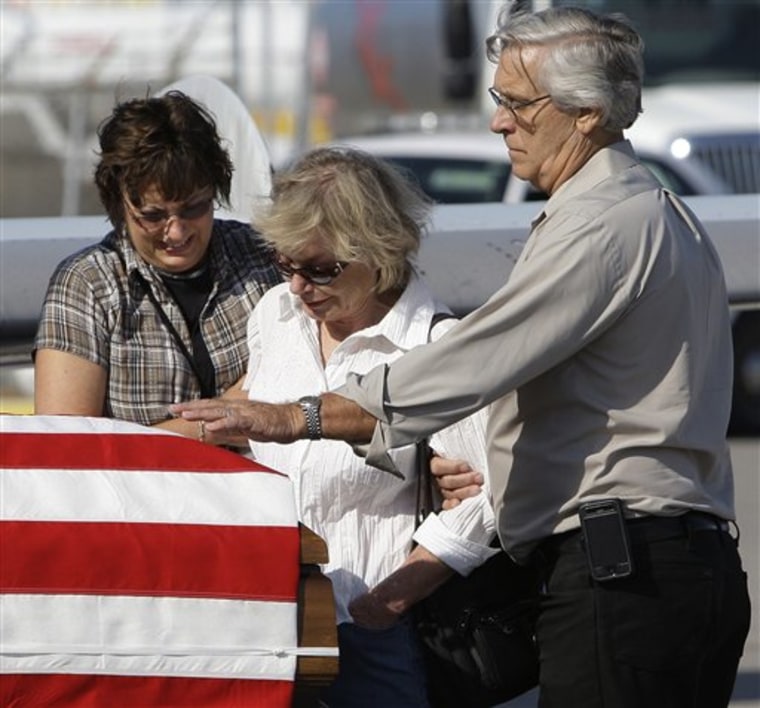It's been a summer of setbacks in Afghanistan — with rising casualties, a divisive election and growing public doubts about the war in the United States and among key allies.
The year began with President Barack Obama promising a new beginning for an old war — long ignored and underfunded by the Bush administration as the spotlight fell on the conflict in Iraq.
As part of a new emphasis, Obama ordered 21,000 troops to Afghanistan and replaced the top U.S. commander with Gen. Stanley McChrystal, who unveiled a strategy shifting the focus from killing insurgents to protecting Afghan civilians, a mindset that helped turn the tide of the Iraq conflict.
At the same time, the administration promised to build up the capabilities of the Afghan government, accelerate the training of Afghan soldiers and police and help the Afghan leadership combat corruption and the flourishing drug trade, which helps finance the insurgency.
Effort appears to falter
Months later, the American effort appears to be faltering.
Hopes that the Afghan presidential election would produce a leader with a strong national mandate have been cast into doubt by allegations of widespread fraud in the Aug. 20 balloting.
Early returns point to a possible runoff between President Hamid Karzai and former Foreign Minister Abdullah Abdullah, probably in October. Final returns are not expected before the middle of next month, but figures released Wednesday show Karzai leading with 44.8 percent of ballots counted to 35.1 percent for Abdullah.
Karzai needs more than 50 percent to avoid a runoff. Many ballots from Karzai's southern strongholds have yet to be counted, and it is possible Karzai may yet surpass the 50 percent mark and claim a first round victory.
Even if he does, however, fraud allegations — not only from Abdullah but some of the other 34 candidates — have so poisoned the political atmosphere that it will be difficult to bring together social and political groups opposed to the Taliban. At the worst, the controversy may trigger street riots and splinter the country along ethnic lines.
The image of Afghan politicians squabbling in Kabul at a time when American and other international soldiers are dying on the battlefield is grimly reminiscent of the darkest days of the Iraq war, when political stagnation in Baghdad helped turn U.S. public opinion against the Bush administration's policy in the 2006 congressional election.
Nearly 300 international troops have been killed in Afghanistan this year, making this the deadliest year since the conflict began in 2001. Two U.S. service members were killed Wednesday in separate attacks in southern and eastern Afghanistan, raising the August death toll to 43 — one short of the July figure which was the highest monthly total of the war.
No sign of retreat for insurgents
At the same time, the insurgents show no sign of shrinking from the fight. With U.S. and British troops focusing operations in Helmand province, the Taliban have quietly tightened their grip in neighboring Kandahar, where a vehicle bomb attack Tuesday killed at least 41 people in an assault that appeared directed at foreign interests in the city.
Taliban intimidation kept many Afghans from the polls in the south last week — despite major U.S. and British military operations aimed at making the vote secure.
U.S. officials have made little effort to gloss over the problems, perhaps mindful of the backlash that stung the Bush administration after years of false optimism in Iraq.
Support for war is wavering
Last weekend, Adm. Mike Mullen, chairman of the Joint Chiefs of Staff, described the situation in Afghanistan as "serious and deteriorating" and told CNN that "I don't think that threat's going to go away."
All this comes as public support for the war both in the United States and Britain is wavering.
A recent Washington Post-ABC News poll found that just over half the respondents said the war in Afghanistan was not worth fighting. A survey last month in Britain found that 58 percent of the respondents believe the war is unwinnable and 52 percent wanted British troops withdrawn immediately.
All these negatives are coming together as McChrystal is preparing to submit a report to the president next week that may include a recommendation for thousands more troops.
‘Significantly more success’
Republican Sen. John McCain has urged McChrystal to ask for more, citing the success of the troop surge in bringing down violence in Iraq. McCain has said that doubling the Marine force from three to six battalions would bring "significantly more success."
But sending more troops to an unpopular, meat-grinder war could be a hard sell among many of Obama's fellow Democrats.
Sen. Russ Feingold, a Wisconsin Democrat who supported the U.S. move into Afghanistan following the Sept. 11, 2001, terrorist attacks, said the U.S. needs a timeline for its departure from the country. Democratic Sen. Sherrod Brown of Ohio expressed frustration with the Afghan government and said he is "concerned that this war not last a whole lot longer."
"We've got to begin seeing changes," Brown said. "We don't stay forever if they don't meet the goals they need to meet."
